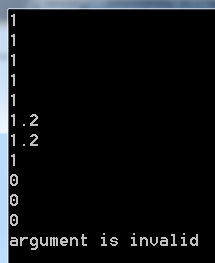c++11实现一个简单的lexical_cast
boost中有一个lexical_cast可以用统一的方式来做基本类型之间的转换,比如字符串到数字,数字到字符串,bool和字符串及数字之间的相互转换。boost::lexical_cast的用法比较简单:

#include <boost/lexical_cast.hpp> #include <iostream> #include <string> #define ERROR_LEXICAL_CAST 1 int main() { using boost::lexical_cast; int a = 0; double b = 0.0; std::string s = ""; int e = 0; try { // ----- 字符串 --> 数值 a = lexical_cast<int>("123"); b = lexical_cast<double>("123.12"); // ----- 数值 --> 字符串 s = lexical_cast<std::string>("123456.7"); // ----- 异常处理演示 e = lexical_cast<int>("abc"); } catch(boost::bad_lexical_cast& e) { // bad lexical cast: source type value could not be interpreted as target std::cout << e.what() << std::endl; return ERROR_LEXICAL_CAST; } std::cout << a << std::endl; // 输出:123 std::cout << b << std::endl; // 输出:123.12 std::cout << s << std::endl; // 输出:123456.7 return 0; }
c++11中缺少lexical_cast方法,但是c++11已经提供了一些基本类型转换的方法,比如to_string, atoi, atof等等,但是我们不能通过一种通用的方式来做基本类型转换,因此我希望做一个类似boost的lexical_cast做基本类型的转换,这也是我们的c++社区的一个开发计划。
由于c++11已经提供了一些便利的方法,我要做的事情就变得很简单了,就是把他们糅合在一起并提供一个统一的lexical_cast的方法即可。
实现思路也很简单,转换主要有这几种:1.数字到字符串的转换;2.字符串到数字的转换;3.bool与字符串的相互转换;4.数字转换为bool;具体的实现代码如下:
#include <type_traits> #include <string> #include <cstdlib> #include <algorithm> #include <stdexcept> #include <cctype> #include <cstring> using namespace std; namespace detail { const char* strue = "true"; const char* sfalse = "false"; template <typename To, typename From> struct Converter { }; //to numeric template <typename From> struct Converter<int, From> { static int convert(const From& from) { return std::atoi(from); } }; template <typename From> struct Converter<long, From> { static long convert(const From& from) { return std::atol(from); } }; template <typename From> struct Converter<long long, From> { static long long convert(const From& from) { return std::atoll(from); } }; template <typename From> struct Converter<double, From> { static double convert(const From& from) { return std::atof(from); } }; template <typename From> struct Converter<float, From> { static float convert(const From& from) { return (float)std::atof(from); } }; //to bool template <typename From> struct Converter<bool, From> { static typename std::enable_if<std::is_integral<From>::value, bool>::type convert(From from) { return !!from; } }; bool checkbool(const char* from, const size_t len, const char* s) { for (size_t i = 0; i < len; i++) { if (from[i] != s[i]) { return false; } } return true; } static bool convert(const char* from) { const unsigned int len = strlen(from); if (len != 4 && len != 5) throw std::invalid_argument("argument is invalid"); bool r = true; if (len == 4) { r = checkbool(from, len, strue); if (r) return true; } else { r = checkbool(from, len, sfalse); if (r) return false; } throw std::invalid_argument("argument is invalid"); } template <> struct Converter<bool, string> { static bool convert(const string& from) { return detail::convert(from.c_str()); } }; template <> struct Converter<bool, const char*> { static bool convert(const char* from) { return detail::convert(from); } }; template <> struct Converter<bool, char*> { static bool convert(char* from) { return detail::convert(from); } }; template <unsigned N> struct Converter<bool, const char[N]> { static bool convert(const char(&from)[N]) { return detail::convert(from); } }; template <unsigned N> struct Converter<bool, char[N]> { static bool convert(const char(&from)[N]) { return detail::convert(from); } }; //to string template <typename From> struct Converter<string, From> { static string convert(const From& from) { return std::to_string(from); } }; } template <typename To, typename From> typename std::enable_if<!std::is_same<To, From>::value, To>::type lexical_cast(const From& from) { return detail::Converter<To, From>::convert(from); } template <typename To, typename From> typename std::enable_if<std::is_same<To, From>::value, To>::type lexical_cast(const From& from) { return from; }
前后花了一个多小时,一个基本的类型转换类就完成了,再测试一下吧,测试代码:
void test() { cout<<lexical_cast<int>(1)<<endl; cout << lexical_cast<int>("1") << endl; cout << lexical_cast<long>("1") << endl; cout << lexical_cast<string>(1) << endl; cout << lexical_cast<bool>(1) << endl; cout << lexical_cast<double>("1.2") << endl; cout << lexical_cast<float>("1.2") << endl; string s = "true"; cout << lexical_cast<bool>(s) << endl; char* p = "false"; cout << lexical_cast<bool>(p) << endl; const char* q = "false"; cout << lexical_cast<bool>(q) << endl; cout << lexical_cast<bool>("false") << endl; cout << lexical_cast<bool>("test") << endl; } int main() { try { test(); } catch (const std::exception& e) { cout << e.what() << endl; } return 0; }
测试结果:

一点梦想:尽自己一份力,让c++的世界变得更美好!
posted on 2015-05-28 21:48 qicosmos(江南) 阅读(4929) 评论(0) 编辑 收藏 举报




